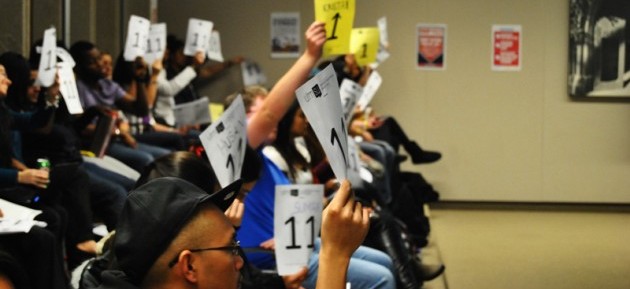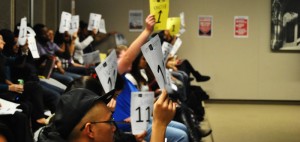Numerous amendments were made to UTMSU’s constitution and bylaws with little discussion or explanation at the Annual General Meeting last Monday.
Out of 90 attendees, most of whom were union volunteers, 700 proxy votes were counted; 88% of votes cast represented students who were not in attendance, and who may not have been aware of the implications of their vote. In the weeks before the AGM, hundreds of students signed off their votes.
“A guy asked me to sign a sheet. He just asked me to give him my vote so he could vote on issues about UTMSU,” said Richard Duong, a fourth-year life sciences student. “He didn’t mention anything about any of the issues that he would be voting on. I didn’t give him my vote because I didn’t know what he’d use it for. I don’t know anything about UTMSU’s issues, so I didn’t want him to use my vote.”
UTMSU is required to present their financial statements and discuss the proposed changes to bylaws. An AGM is meant to provide a forum for accountability and transparency, although UTMSU has yet to publicize two months’ worth of meeting minutes on their website.
VP Internal Negan Alim presented the audited financial statement of the previous year. In his opening remarks, president Gilbert Cassar said that UTMSU had increased club funding and salaries to enhance student services.
There was no mention of the $120,000 of student money that was taken from the contingency fund to subsidize the summer U-Pass or the union’s plan to replace the funds. The contingency fund is an emergency reserve.
The bylaws regarding election procedures and the addition of a new division to the Board of Directors were externalized for further scrutiny.
The membership of the Elections and Referenda Committee, charged with the responsibility of overseeing elections and enforcing conduct procedures, was changed to include one more executive and one less director on the board, leaving more than half of the decision-making power of the committee with incumbent UTMSU executives. Each year, a current executive (i.e., a VP) chooses to run for the position of president. Due to the change in membership, more than half of the ERC will now be comprised of that candidate’s colleagues.
According to Cassar, the amendment will add greater expertise to the committee since executives have previous experience with campus elections. It also provides more flexibility for directors that want to campaign.
A fifth division was added to the Board of Directors to provide representation for students in the new Mississauga Academy of Medicine. The students are members of the St. George campus and do not pay membership fees to UTMSU. The two groups intend to hold a referendum to gain membership in the union for MAM students.
By preeminently creating a fifth division for MAM students, said Cassar, UTMSU is “preparing for the future”.
Every motion passed unanimously, with one exception: a bylaw referring to the campus newspaper passed, opposed only by a former board director.
They changed the bylaw that required UTMSU to advertise with a campus newspaper—The Medium. The wording was changed to “campus publications”. The change will allow the union to advertise with other sources and use social media to promote their events, explained Cassar.
The union already uses Twitter and Facebook to advertise and promote their organization.
“There is the possibility that this takes away the need to advertise in the student newspaper,” said Thomas Kristan, a fourth-year student. “I don’t think that the student union would purposely try and do that. I think that they would keep using the student newspaper. I’m just wondering why it couldn’t be along the lines of the ‘student newspaper and additional publications’.”
Nearing the end of the meeting, executives made announcements to promote upcoming events, such as the Drop Fees rally, the drop credit initiative, and the UTM Talent Show. Attendees took advantage of the microphone, which had gone relatively unused during discussion periods about finances and bylaws, to express their approval of the work done this year by UTMSU. Corey Scott, VP Internal of the U of T Students’ Union, praised UTMSU for contributing petitions with 2,200 signatures for the Drop Fees campaign, the most out of all three campuses.
“It’s really through solidarity and not just internal within the campus,” Cassar said. “It’s across the university that really brings success at every level.”


